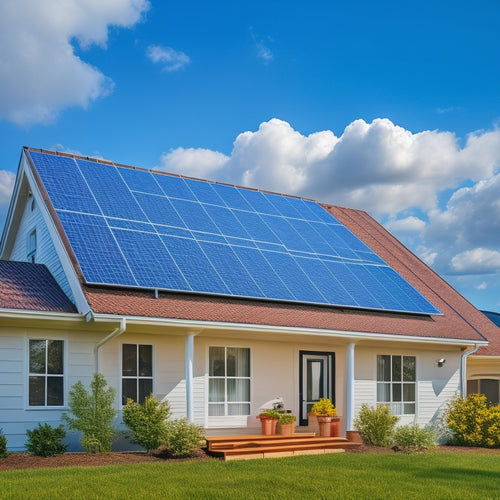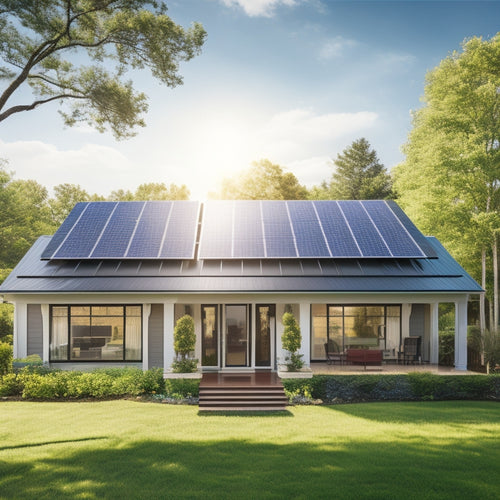
Maximizing Efficiency With Solar Panel and Battery Pack Systems
Share
To maximize efficiency with solar panel and battery pack systems, assess your energy needs carefully. Start by evaluating your consumption patterns and identifying peak demand times. Choose high-efficiency solar panels and compatible lithium-ion batteries for top performance. Integrate smart technology for real-time monitoring and adaptive energy management, reducing costs even further. With effective energy storage, you can harness excess solar energy during peak hours, decreasing reliance on the grid. Understanding the key components of your system enhances overall effectiveness. By exploring these strategies further, you'll uncover additional understanding to improve your energy management strategy.
At a Glance
- Assess energy consumption patterns to tailor solar panel systems and optimize efficiency based on specific energy needs.
- Utilize high-efficiency solar panel types, such as monocrystalline, to maximize energy output in limited spaces.
- Implement battery pack options, like lithium-ion, for enhanced storage capacity and reduced maintenance requirements.
- Integrate smart technology for real-time monitoring and adaptive energy management to further maximize efficiency.
- Leverage government incentives and financing options to reduce upfront installation costs and improve long-term savings.
Cost-Effective Energy Solution
Switching to solar panel systems can drastically reduce your energy bills while providing a sustainable energy source.
By incorporating energy storage solutions, businesses can maximize their energy efficiency and further decrease their reliance on utility companies.
You can also take advantage of various government incentives that greatly offset installation costs, such as financial incentives and tax benefits.
This combination makes solar power not just an eco-friendly choice, but a financially smart one as well.
Lower Energy Bills
By utilizing solar energy, homeowners can greatly reduce their monthly energy bills, making solar panel systems a cost-effective energy solution.
With the integration of smart technology, you can optimize energy efficiency in your home, ensuring that you capture the maximum potential of your solar panels. Smart systems allow real-time monitoring and adaptive energy management, which means you can shift your energy consumption to peak sunlight hours, further decreasing reliance on grid power.
Investing in a battery pack in conjunction with solar panels amplifies these benefits. By storing excess energy generated during sunny days, you can power your home during peak hours or cloudy days without incurring additional costs from utility providers. This not only enhances your energy independence but also stabilizes your monthly energy expenses.
Moreover, as energy prices continue to fluctuate, having a solar panel system with integrated smart technology provides a buffer against rising costs. You can take control of your energy usage and expenses, ensuring that you're not at the mercy of market volatility.
Embracing solar energy isn't just a smart financial decision; it's a step towards true energy freedom.
Government Incentives Available
Government incentives play an essential role in making solar panel systems an even more cost-effective energy solution for homeowners. By utilizing federal tax credits, you can greatly reduce the upfront costs associated with installation. These credits often cover a substantial percentage of your investment, allowing you to tap into the sun's power without a hefty price tag.
In addition to federal support, many states offer rebates and local incentives that further lower your out-of-pocket expenses. Exploring financing options, such as solar loans, lets you spread the cost over time while still benefiting from immediate energy savings.
Installation grants and energy credits available through various utility programs can also improve your return on investment.
Moreover, investing in solar can elevate your property value, making it an attractive option for future buyers. If you're unable to install panels on your property, consider community solar programs, which allow you to participate in solar energy without physical installation.
Environmental Impact Reduction
By integrating solar panel systems into your energy strategy, you greatly reduce your carbon footprint and promote renewable energy adoption.
This change not only lowers greenhouse gas emissions but also enhances your sustainability profile.
Community solar programs allow you to share the benefits of clean energy with others, further amplifying the positive environmental impact.
As you shift to solar, you're actively contributing to a cleaner, more efficient energy environment.
Carbon Footprint Minimization
Integrating solar panel systems can greatly reduce your carbon footprint, making a substantial impact on environmental sustainability. By utilizing solar energy, you're not only utilizing a renewable resource but also minimizing reliance on fossil fuels, which are major contributors to greenhouse gas emissions. This shift aligns with sustainable practices and promotes eco-friendly technologies that benefit both you and the planet.
Here's a breakdown of how solar panel systems contribute to carbon footprint minimization:
| Aspect | Impact |
|---|---|
| Energy Generation | Reduces carbon emissions considerably |
| Long-term Savings | Lowers utility bills, enhancing economic freedom |
| Maintenance Requirements | Minimal upkeep, promoting convenience |
Renewable Energy Adoption
Solar panel systems play an essential role in the larger structure of renewable energy adoption, greatly contributing to environmental impact reduction. By utilizing sunlight, you're not just generating power; you're actively participating in a groundbreaking movement toward a sustainable future.
Renewable energy policies are vital in this situation, as they create the regulatory environment that encourages investments in solar technology. When these policies are strong, they pave the way for increased adoption of solar panels, making clean energy accessible to everyone.
Community solar initiatives further enhance this adoption. They allow multiple households to share the benefits of a single solar installation, democratizing energy access and cultivating a collective commitment to sustainability. By participating in these programs, you're not only reducing your carbon footprint but also promoting local energy resilience.
Embracing solar technology and advocating for supportive renewable energy policies enables you to contribute to a greener planet. The shift toward solar energy represents a collective freedom from fossil fuel dependency, allowing you to take charge of your energy needs while minimizing environmental impact.
This is how you, alongside your community, can drive the renewable energy revolution forward.
Key System Components
To maximize the efficiency of your solar panel system, understanding the key components is essential.
You'll need to evaluate different solar panel types and their efficiencies, as well as consider various battery pack options for energy storage.
Selecting the right battery type is critical; for instance, lithium-ion batteries are recommended for long durations, ensuring your system can effectively handle energy needs during outages.
Each choice impacts your system's performance and overall return on investment.
Solar Panel Types
While choosing the right type of solar panel is essential for maximizing energy efficiency, understanding the key components that make up these systems can greatly influence your decision.
You'll encounter several panel types, each with unique characteristics. Monocrystalline panels are known for their high solar panel efficiency and sleek design, making them ideal for limited space. Polycrystalline panels offer a cost-effective alternative, though they generally have slightly lower efficiency.
If you're looking for versatility, thin film technology provides lightweight and flexible solar panels that can be integrated into various surfaces, including building integrated photovoltaics. For those seeking enhanced performance, bifacial modules capture sunlight on both sides, increasing energy output.
When considering installation, think about the panel installation techniques that align with your property's needs. Incorporating solar tracking systems can further improve efficiency by adapting to the sun's movement.
Additionally, prioritize durable materials that withstand the elements, ensuring longevity and reduced maintenance. By evaluating these solar panel types and their innovations, you'll be better equipped to utilize solar energy effectively, granting you the freedom to take control of your energy needs.
Battery Pack Options
Effective energy storage is vital for utilizing the full potential of your solar panel system, and choosing the right battery pack can make a significant difference. When selecting a battery pack, you'll typically choose between lithium ion and lead acid batteries.
Lithium ion batteries offer higher energy storage capacity, longer battery lifespan, and fewer maintenance requirements compared to lead acid options. They also support a greater number of charging cycles, which is essential for maximizing efficiency.
Consider how battery capacity aligns with your energy needs and usage patterns. Smart technology integration systems can enhance the functionality of your battery pack, allowing for real-time monitoring and optimizing energy use. This capability guarantees you're utilizing solar energy effectively, reducing your dependence on the grid.
Grid compatibility is another significant factor; confirm your battery system can seamlessly integrate with grid services. A reliable battery pack not only strengthens your independence but also improves your energy resilience.
As you investigate battery pack options, weigh the pros and cons of each type to determine which aligns best with your goals for freedom and sustainability. Making an informed choice will boost your solar panel system's performance and longevity.
Selecting Based on Energy Needs
To select the right solar panel system, you first need to assess your energy consumption patterns. By identifying your peak demand, you can tailor the system to meet your specific requirements, ensuring maximum efficiency.
Additionally, implementing lifestyle adjustments, such as choosing energy-efficient appliances, can further reduce your overall energy needs and enhance sustainability. This strategic approach not only maximizes energy output but also enhances cost-effectiveness over time.
It is essential to create an energy profile with device power ratings and usage hours for accurate evaluation creating an energy profile.
Assessing Energy Consumption
Typically, homeowners overlook the critical step of reviewing their energy consumption before selecting a solar panel system. Conducting an energy audit is vital to understand your specific needs. Start by analyzing your consumption patterns over the past year; this data reveals when and how much energy you typically use.
With this understanding, you can identify key appliances and systems that contribute to your overall consumption. Are you heavily reliant on heating or cooling systems? Do you have energy-efficient appliances? By pinpointing these consumption habits, you can make informed decisions about the size and type of solar panel system necessary to meet your energy demands.
Moreover, understanding your energy usage helps you design a more effective battery pack system to store excess solar energy. This way, you can maximize your energy independence, reducing reliance on the grid and lowering utility bills.
Investing time in evaluating your energy consumption isn't just prudent; it enables you to tailor a solar solution that aligns with your lifestyle and aspirations. Ultimately, this strategic approach guarantees that you utilize the freedom and flexibility that solar energy can provide.
Identifying Peak Demand
Understanding your energy consumption lays the groundwork for identifying peak demand periods, which is vital when selecting a solar panel system customized to your needs. To maximize the benefits of solar energy, you need to pinpoint when your energy usage spikes, typically during peak hours.
Analyze your consumption patterns over time; this will enable you to forecast your demand accurately. Demand forecasting involves examining historical data to predict future energy needs. By understanding when your peak demand occurs—whether it's in the evening when everyone's home or during the day when appliances are running—you can make informed decisions.
This understanding allows you to size your solar panel system effectively, ensuring it generates enough power to meet your demands during those peak hours.
Moreover, incorporating a battery pack can further enhance your energy independence. By storing excess energy generated during low-demand periods, you can employ it during peak hours, reducing reliance on the grid and maximizing efficiency.
You're not just investing in a solar panel system; you're strengthening your lifestyle, ensuring energy availability when you need it most. Welcome this freedom by strategically aligning your energy solutions with your consumption patterns.
Long-Term Savings Potential
When you invest in solar panel systems, you greatly reduce your energy costs over time.
With decreasing reliance on the grid, you'll notice a steady decline in your monthly utility bills, maximizing your savings potential.
This shift not only benefits your wallet but also contributes to a more sustainable energy future.
Reduced Energy Costs
By investing in solar panel systems, you can greatly reduce your energy costs over time. These systems capture renewable energy, greatly decreasing your reliance on traditional power sources.
Making use of smart technology, such as energy-efficient inverters and monitoring systems, optimizes your power consumption by adjusting energy usage based on real-time data.
You'll notice that your electricity bills start to decline as solar panels generate clean energy during peak sunlight hours. Coupled with battery pack systems, you can store excess energy for later use, ensuring that you're not only saving money but also maximizing your energy efficiency.
This setup allows you to take advantage of solar energy even during non-sunny periods, further enhancing your savings.
Moreover, as utility rates continue to rise, your fixed solar investment becomes increasingly beneficial. The long-term savings potential from reduced energy costs provides not just financial freedom but also energy independence.
You won't just be a consumer; you'll be part of a movement toward sustainable living. By embracing solar technology, you're securing a greener future while enjoying the benefits of lower energy expenses today.
The combination of solar panels and battery packs truly enables you to take control of your energy usage.
Frequently Asked Questions
How Do Solar Panel and Battery Systems Work Together?
Solar collaboration occurs when you connect solar panels to battery systems, storing excess energy for later use. This setup enhances your energy independence, allowing you to capture and employ renewable power efficiently, even during outages.
What Maintenance Is Required for Solar Panel and Battery Systems?
To maintain solar panel and battery systems, you need regular panel cleaning to optimize efficiency, along with consistent battery monitoring to guarantee performance. Neglecting these tasks can lead to reduced energy output and shorter lifespans.
Can I Install Solar Panels and Batteries Myself?
You can tackle DIY installation of solar panels and batteries, but consider safety considerations, local regulations, and tools needed. Conduct a cost analysis and keep troubleshooting tips handy for potential challenges during installation.
What Happens During a Power Outage With These Systems?
During a power outage, your system automatically switches to backup power, ensuring uninterrupted power supply. This enhances your energy independence and grid resilience, allowing you to maintain essential functions while enjoying freedom from utility disruptions.
Are There Any Government Incentives for Solar and Battery Systems?
Yes, you can benefit from federal tax credits, state rebates, and installation grants. These incentives enhance energy efficiency, reduce upfront costs, and enable you to adopt renewable energy, granting you both freedom and sustainability in your choices.
Explore More
In a world where energy costs keep rising, you might think relying on traditional sources is the only option. Yet, investing in solar panel and battery pack systems proves to be the ultimate irony. By embracing this innovative technology, you're not only slashing your energy bills but also contributing to a greener planet. So, while others cling to outdated methods, you'll be the one reaping long-term savings and efficiency—who knew going green could feel so rewarding?
Related Posts
-

Renewable Energy Solutions to Reduce Your Carbon Footprint
To reduce your carbon footprint, adopting renewable energy solutions is key. Using solar panels or wind turbines can ...
-

Cost of Solar Panel Installation
You can expect to pay between $15,000 and $30,000 or more for a typical solar panel installation, depending on the sy...
-

Home Solar Installation Cost
You're considering installing solar panels on your home, and the upfront cost is likely the biggest hurdle standing i...


